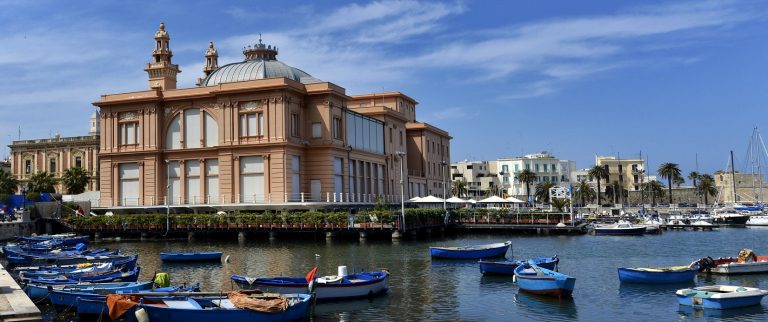INFN (http://www.infn.it) is one of the leading organizations worldwide promoting basic scientific research and has tight connections with DOE activities in many areas of interest:
Project name: Machine learning for Higgs boson cross section measurements
Title: Machine learning for the measurement of the cross section for the production of the Higgs boson in vector boson fusion topology
Particle Physics, Astroparticle Physics, Nuclear Physics, Theoretical Physics and Detector Physics.
Experiment: CMS
Reaserch group: INFN Bari - Group 1
We call for applications of US students willing to join a INFN research team in Italy- BARI for a two-month period between June 1st - July 31st and September 1st - October 31st, 2020.
Description of the activities:
The project consists of using machine learning techniques for the analysis of the data collected by the CMS experiment at the Large Hadron Collider (LHC) in order to derive an optimal discrimination of the signal for the production of the Higgs boson via a vector boson fusion mechanism, from the background.
The final state includes two jets dose to LHC beam line of the protons and a Higgs boson decaying in two Z bosons and then in four charged leptons.
The student is asked to analyze the structure of the data and use them for the training of the machine learning algorithms both for the best configuration and for the best discrimination of the signal from the background. The usage of "deep neuro/ networks","artificio/ neuro/ networks" and "boosted decision trees" techniques is foreseen.
AII the data collected by CMS during the Run2 will be analyzed in arder to derive a measurement of the cross section of the production of the Higgs boson in the topology studied.
Tutor: Questo indirizzo email è protetto dagli spambots. È necessario abilitare JavaScript per vederlo.
Local secretariat: Antonio Silvestri
Furter information: lodging in CampusX residence
Project name: Configuration of a HEP analysis workflow in a Jupyter environment with the aid of GooFit and PROOF-Lite tools.
Title:
Particle Physics, Astroparticle Physics, Nuclear Physics, Theoretical Physics and Detector Physics.
Experiment: CMS
Reaserch group: INFN Bari - Group 1
We call for applications of US students willing to join a INFN research team in Italy- BARI for a two-month period between May 25th - July 25th 2020.
Description of the activities:
In recent years, new technologies and new approaches have been developed in industry and academia to answer to the necessity to both handle and visualize easily huge amount of
data, the so called “big data”.
Good examples are the PANDAS framework, which is an open source set of data analysis tools allowing data structures building and fast manipulation, and the Jupyter Notebook, which is a web application that allows users to create and share documents that contain executable live code.
The combination of these two technologies may result in a powerful and easy-to-use tool for a data analyst in the context of High Energy Physics.
A student working on this project will join the efforts of the CMS Bari B-Physics group and will help to configure, test and document a complete HEP analysis workflow in a Jupyter environment, eventually comparing it to a conventional ROOT-based workflow.
A first step will involve the skimming, executed on multiple core via PROOF-Lite, and conversion to PANDAS-like dataframes, through tools such as uproot, of the traditional ROOT dataset files. The second part will be completely developed within the Jupyter Notebook framework and will include data manipulation, feature extraction, visualization and interpolation.
The last task, when the dataset population will require it, will be handled with the help of GooFit, a tool that exploits the computational capabilities of GPU to
perform maximum likelihood fits.
The student should have a good background in Python programming.
Some experience with C++ will be useful. Background in physics or statistics would also be useful.
Candidates are not requested to be already involved in the CMS experiment.
Further references:
https://jupyter.org
https://pandas.pydata.org
https://uproot.readthedocs.io/en/latest/
https://root.cern.ch
https://pandas.pydata.org
https://github.com/GooFit/GooFit
Tutors: Questo indirizzo email è protetto dagli spambots. È necessario abilitare JavaScript per vederlo. - Questo indirizzo email è protetto dagli spambots. È necessario abilitare JavaScript per vederlo.
Local secretariat: Antonio Silvestri
Our group is also in contact with a student association which arranges accommodation for visiting students and professors.
Bari is the capital of the Puglia region and one of the biggest cities in the south of Italy.

Typical maritime and market city, Bari developed industrially in the second half of the twentieth century and nowadays boasts an important trade fair, the largest in the southern Italy.
Tourists visit Bari for its historic buildings, art works and fascinating town centre, as well as for the beaches surrounding the area.
The city is also characterised by a very active cultural life, also thanks to its University, which is attended by many students from both southern Italy and other countries of the Mediterranean areas.
For further suggestions on Bari and the Puglia region, please visit the following web page: Viaggiare in Puglia


